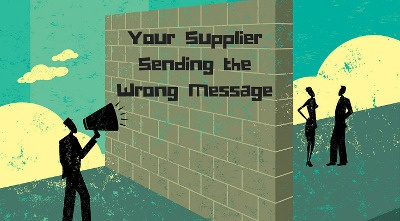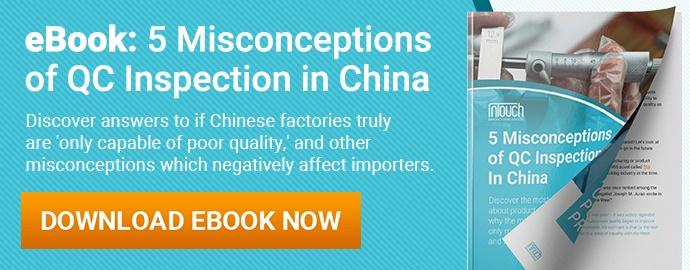 “What did he say?” you ask the factory translator after the manager’s long-winded response to your question about when your goods will ship.
“What did he say?” you ask the factory translator after the manager’s long-winded response to your question about when your goods will ship.
The translator rubs his neck nervously. After some hesitation, he tells you the ex-factory date is just a week away. Even though the translator has told you good news, the reserved expression on his face tells there’s more he’s not saying. You may be dealing with supplier miscommunication.
Doing business in a foreign country can be tricky, especially if you don’t speak the language. Sometimes you never know if there’s mutual understanding or supplier miscommunication. They might be telling you what they think you want to hear. Or you might be committing a cultural offense of some sort (related: 5 Misconceptions of QC Inspection in China [eBook]).
If you’ve sat down at a meeting with a supplier without a translator, you know that much of the discussion is spent not understanding a single word of what is being said. It may feel like the factory’s translator is your only ally, particularly when they seem to do their best to keep you in the loop about what is being said. But this ally can end up becoming your biggest road block if you’re not careful.
Your supplier may be knowingly or unknowingly sending you the wrong message. Here are three possible reasons why:
1. Your supplier contact may be a salesman or “yes-man”
English is currently the international language of business. But that doesn’t mean that all business-people learn English. Except for employees in customer service or sales, you’ll likely find that most Asian factory owners and workers have little or no English language ability, which increases the likelihood of supplier miscommunication.
A typical salesperson’s main goal is to make a sale, and so by extension, make you happy.  This makes it very difficult for them to deliver bad news or information they believe you won’t want to hear. They may try to put a positive spin on what they are reporting or just forego telling you bad news altogether.
This makes it very difficult for them to deliver bad news or information they believe you won’t want to hear. They may try to put a positive spin on what they are reporting or just forego telling you bad news altogether.
Solution: If you suspect you’re not hearing the full truth about what’s happening at the factory, get in contact with the QC manager or factory manager where your products are being made. And if you suspect the person translating might be holding back during a face-to-face meeting, bring your own translator.
You can also hire an independent QC inspector to visit the factory and report on what’s happening with your product. This may be a better solution if you want intricate details about your order and you need someone that can communicate with factory staff in their local language.
2. Your supplier contact may be very young
The other group of people most likely to speak English, especially in countries like China, are students and recent graduates. In recent years in China, most college graduates are required to pass rigorous English tests before they can receive their degree.
English-speaking supplier contacts are often recent graduates hired for their strong English communication skills to make foreign customers feel more comfortable. But these youths are often lacking in practical manufacturing or business experience. And this makes it very easy for them to mishandle or misunderstand situations (related: Why You Can't Assume Chinese Suppliers Understand Requirements). This can be a huge problem when misunderstanding a few words or simple processes leads to manufacturing a faulty product for you.
Solution: Make sure to send detailed specifications of the product to your supplier contact AND walk them through details that might be easily misunderstood or misinterpreted.
You may want to send photos of any specific quality defects with their product as well. This helps to clarify with the supplier what is and is not acceptable.
3. Offices are often far removed from actual operations
Sometimes you may be working through a supplier contact that does not work in the factory. Instead, they may be working out of an office no where near the actual production site. They aren’t going to be deeply involved in the manufacturing or design of the product you are buying.
where near the actual production site. They aren’t going to be deeply involved in the manufacturing or design of the product you are buying.
This is especially true of vendors or trading companies. For example, your product may be manufactured in Mainland China, but your main point of contact lives and works in Taiwan or Hong Kong.
This presents a couple of potential problems:
- Even if your contact is telling you everything they know, they might not be fully updated with the factory’s progress and your order status.
- Much of the information your contact is passing on to you will be secondhand from their various operations contacts. If you’ve ever played the telephone game as a child you know how a message can change each time it's passed along. This is especially true when in a different language!
Solution: Like earlier advice offered, try to speak with someone from the factory directly. This can be difficult if you’re working through a trading company or a vendor that doesn’t want to reveal the name of the factory. But if you can speak with someone on the factory floor, you’re far more likely to get accurate and current information.
An inspector that visits the factory is also likely to provide insight that your supplier contact might not have.
Conclusion
A lot of buyers express frustration in getting accurate information from their supplier. Supplier miscommunication can lead to shipping delays, quality problems and a host of other issues. Communication by phone, email or even through a face-to-face meeting at the factory can leave a lot of room for interpretation.
It’s important to understand the reasons why miscommunication can happen between you and your supplier before you can learn how to prevent it.
"The single biggest problem in communication is the illusion that it has taken place." - George Bernard Shaw
And sometimes miscommunication occurs because importers, not suppliers, misunderstand how QC inspection works in China. Click on the link below to find out if you're holding onto any of these misconceptions!







